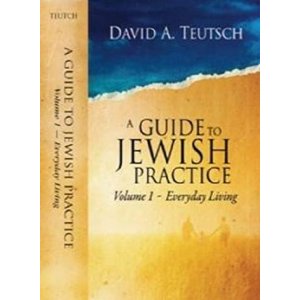Are there resource guides for modern Jews, or on the subject of modern Judaism for others?
My bookshelf is loaded with theology. Make that bookshelves—three of them, crammed with as much Waskow, Armstrong, Schachter-Shalomi, Kaplan and Michaelson as I can fit into one three-room apartment. When non-Jewish friends ask me for a book about Judaism, I balk. It’s not that I don’t have plenty to offer. I do. But a lot of these books are for the already-initiated (except, perhaps, for Karen Armstrong). I only have a few texts that can appeal to my voracity for study as well as offer a crash course in the basics for others.

A quote on the book’s jacket from Moses Pava, director of Yeshiva University’s Syms School of Business, designates “Everyday Living” a kind of “Shulkhan Aruch for Reconstructionist Jews,” and it is easy to see why, though this book will appeal to many, regardless of affiliation. Compiled by the Reconstructionist Rabbinical College’s Rabbi Dr. David Teutsch — a graduate of Harvard University and the Hebrew Union College — the book is the first of a three-volume guide to Jewish ritual, theology, ethics and philosophy as it exists in the modern age. Teutsch has previously edited the Reconstructionist movement’s “Kol Haneshema” siddurim.
Culled from a variety of sources and highlighting the diversity of practice across a broad spectrum, traditional and progressive, “Everyday Living” is noteworthy, if only for its sheer size and ambition. From keeping kosher to communication ethics, it offers a wide variety of voices on each subject. In fact, this is both the greatest strength and the greatest weakness of “Everyday Living.” The book has so much information, much of it displayed in the lower margins of each page, that the sheer weight of the information is overwhelming at first.
Organized to present perspectives within each of the major Jewish streams, the main body of the text is supplemented by commentary from learned scholars. This makes it an extraordinarily thorough read. While it acts as a pure encyclopedia of progressive Jewish thought, it also serves as a sort of study guide to approaching each of these topics spiritually. Quotations from Jewish leaders offset the main text, giving a warm touch to heady material. It renders the tome both clinically educational and surprisingly thoughtful. Be warned, however: the data overload is surprising.
For example, on the book’s section titled, “Truth, Lies, and Advertising,” some twelve separate paragraphs are spread out on the bottom half of about three pages: quotes from scholars and thinkers. The commentaries themselves are almost disproportionate to the main body of the text, which offers a concise presentation on the role of truth-telling in ethics. While this presentation isn’t inherently bad—if nothing else, it renders “Everyday Living” an exhaustive source of modern rabbinic thought—the page layout itself could be confusing at first. Use it for a while, however, and the logic presents itself.
The commentaries themselves range from thought-provoking (a comment on existing in the tension between honoring one’s parents and being a survivor of abuse is particularly poignant in a section on “Obligations of Children to Parents”) to unnecessary or repetitive (a reminder of the perpetual presence of the Divine Voice in a section on “Torah Study”). This isn’t a fault, per se, but it keeps the book from being as concise as it could have been, without sacrificing a thorough approach. Praise should be given to the fact that “Everyday Living” approaches the personal and the intimate with the same affection as Serious Matters of Great Theological Significance.
The central question of any undertaking such as this becomes: Is it really necessary? To offer a text exploring a particular idea of Jewish thought, ideally with the author’s unique spin, seems reasonable. Most books of theology fall into this category. However, to codify a faith that already seems to have its fair share of codified reference guides seems superfluous. A careful reading of “Everyday Living” immediately puts those doubts aside, however. This book works because of its accessible language as much as its theologically diverse offerings. It is a work for lay people as much as rabbinic students, an attempt to unify the academic and the plain.
It hasn’t been finished yet, but when Tuetsch’s three-volume Guide is fully published, it may stand as one of the crowning achievements of modern Judaism—a collection of Jewish thought on par with Mordecai Kaplan’s “Judaism as a Civilization” or Joseph Telushkin’s “Code of Jewish Ethics.” It already succeeds as one of the most complete records of the progressive Jewish world, and the best book I’ve acquired all year.
